HPS204: Report on Research Methods in Social Psychology Studies
VerifiedAdded on 2023/01/17
|15
|3888
|41
Report
AI Summary
This report delves into the research methods employed in social psychology, examining the interconnectedness of study objectives, theoretical perspectives, and analytical techniques. The study analyzes various methods, including laboratory experiments, field tests, and self-report techniques, within the context of quantitative and qualitative approaches. It explores the historical debates and methodological diversity within the field, considering the influence of epistemological dialogues and the impact of geographic distribution on research practices. The report also highlights the importance of considering cultural differences and the potential limitations of generalizing findings across different populations, emphasizing the need for diverse samples in social psychological research. The report concludes by analyzing the evolution and application of these methodologies, providing a comprehensive overview of the field's research landscape.
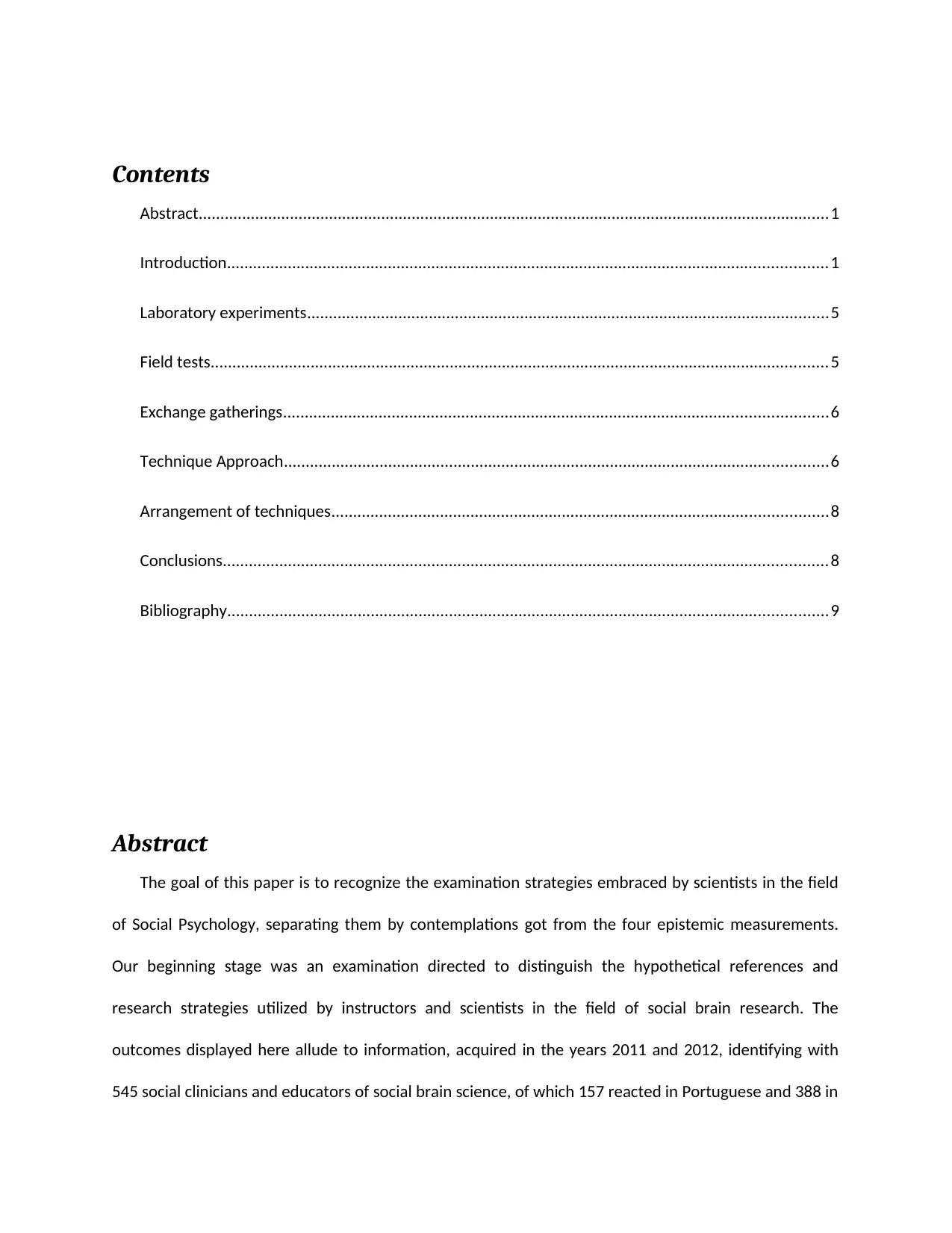
Contents
Abstract.................................................................................................................................................1
Introduction..........................................................................................................................................1
Laboratory experiments........................................................................................................................5
Field tests..............................................................................................................................................5
Exchange gatherings.............................................................................................................................6
Technique Approach.............................................................................................................................6
Arrangement of techniques..................................................................................................................8
Conclusions...........................................................................................................................................8
Bibliography..........................................................................................................................................9
Abstract
The goal of this paper is to recognize the examination strategies embraced by scientists in the field
of Social Psychology, separating them by contemplations got from the four epistemic measurements.
Our beginning stage was an examination directed to distinguish the hypothetical references and
research strategies utilized by instructors and scientists in the field of social brain research. The
outcomes displayed here allude to information, acquired in the years 2011 and 2012, identifying with
545 social clinicians and educators of social brain science, of which 157 reacted in Portuguese and 388 in
Abstract.................................................................................................................................................1
Introduction..........................................................................................................................................1
Laboratory experiments........................................................................................................................5
Field tests..............................................................................................................................................5
Exchange gatherings.............................................................................................................................6
Technique Approach.............................................................................................................................6
Arrangement of techniques..................................................................................................................8
Conclusions...........................................................................................................................................8
Bibliography..........................................................................................................................................9
Abstract
The goal of this paper is to recognize the examination strategies embraced by scientists in the field
of Social Psychology, separating them by contemplations got from the four epistemic measurements.
Our beginning stage was an examination directed to distinguish the hypothetical references and
research strategies utilized by instructors and scientists in the field of social brain research. The
outcomes displayed here allude to information, acquired in the years 2011 and 2012, identifying with
545 social clinicians and educators of social brain science, of which 157 reacted in Portuguese and 388 in
Paraphrase This Document
Need a fresh take? Get an instant paraphrase of this document with our AI Paraphraser
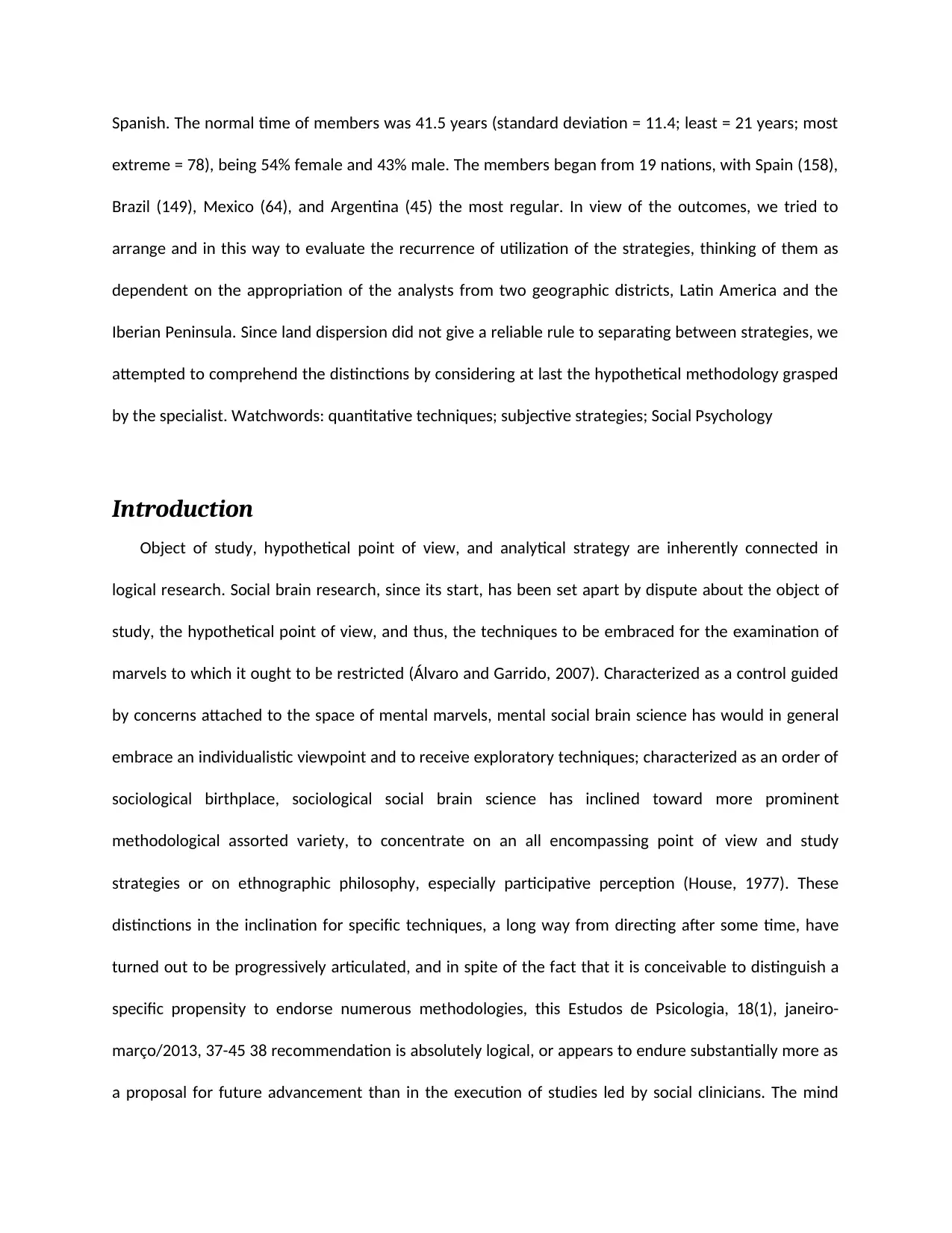
Spanish. The normal time of members was 41.5 years (standard deviation = 11.4; least = 21 years; most
extreme = 78), being 54% female and 43% male. The members began from 19 nations, with Spain (158),
Brazil (149), Mexico (64), and Argentina (45) the most regular. In view of the outcomes, we tried to
arrange and in this way to evaluate the recurrence of utilization of the strategies, thinking of them as
dependent on the appropriation of the analysts from two geographic districts, Latin America and the
Iberian Peninsula. Since land dispersion did not give a reliable rule to separating between strategies, we
attempted to comprehend the distinctions by considering at last the hypothetical methodology grasped
by the specialist. Watchwords: quantitative techniques; subjective strategies; Social Psychology
Introduction
Object of study, hypothetical point of view, and analytical strategy are inherently connected in
logical research. Social brain research, since its start, has been set apart by dispute about the object of
study, the hypothetical point of view, and thus, the techniques to be embraced for the examination of
marvels to which it ought to be restricted (Álvaro and Garrido, 2007). Characterized as a control guided
by concerns attached to the space of mental marvels, mental social brain science has would in general
embrace an individualistic viewpoint and to receive exploratory techniques; characterized as an order of
sociological birthplace, sociological social brain science has inclined toward more prominent
methodological assorted variety, to concentrate on an all encompassing point of view and study
strategies or on ethnographic philosophy, especially participative perception (House, 1977). These
distinctions in the inclination for specific techniques, a long way from directing after some time, have
turned out to be progressively articulated, and in spite of the fact that it is conceivable to distinguish a
specific propensity to endorse numerous methodologies, this Estudos de Psicologia, 18(1), janeiro-
março/2013, 37-45 38 recommendation is absolutely logical, or appears to endure substantially more as
a proposal for future advancement than in the execution of studies led by social clinicians. The mind
extreme = 78), being 54% female and 43% male. The members began from 19 nations, with Spain (158),
Brazil (149), Mexico (64), and Argentina (45) the most regular. In view of the outcomes, we tried to
arrange and in this way to evaluate the recurrence of utilization of the strategies, thinking of them as
dependent on the appropriation of the analysts from two geographic districts, Latin America and the
Iberian Peninsula. Since land dispersion did not give a reliable rule to separating between strategies, we
attempted to comprehend the distinctions by considering at last the hypothetical methodology grasped
by the specialist. Watchwords: quantitative techniques; subjective strategies; Social Psychology
Introduction
Object of study, hypothetical point of view, and analytical strategy are inherently connected in
logical research. Social brain research, since its start, has been set apart by dispute about the object of
study, the hypothetical point of view, and thus, the techniques to be embraced for the examination of
marvels to which it ought to be restricted (Álvaro and Garrido, 2007). Characterized as a control guided
by concerns attached to the space of mental marvels, mental social brain science has would in general
embrace an individualistic viewpoint and to receive exploratory techniques; characterized as an order of
sociological birthplace, sociological social brain science has inclined toward more prominent
methodological assorted variety, to concentrate on an all encompassing point of view and study
strategies or on ethnographic philosophy, especially participative perception (House, 1977). These
distinctions in the inclination for specific techniques, a long way from directing after some time, have
turned out to be progressively articulated, and in spite of the fact that it is conceivable to distinguish a
specific propensity to endorse numerous methodologies, this Estudos de Psicologia, 18(1), janeiro-
março/2013, 37-45 38 recommendation is absolutely logical, or appears to endure substantially more as
a proposal for future advancement than in the execution of studies led by social clinicians. The mind
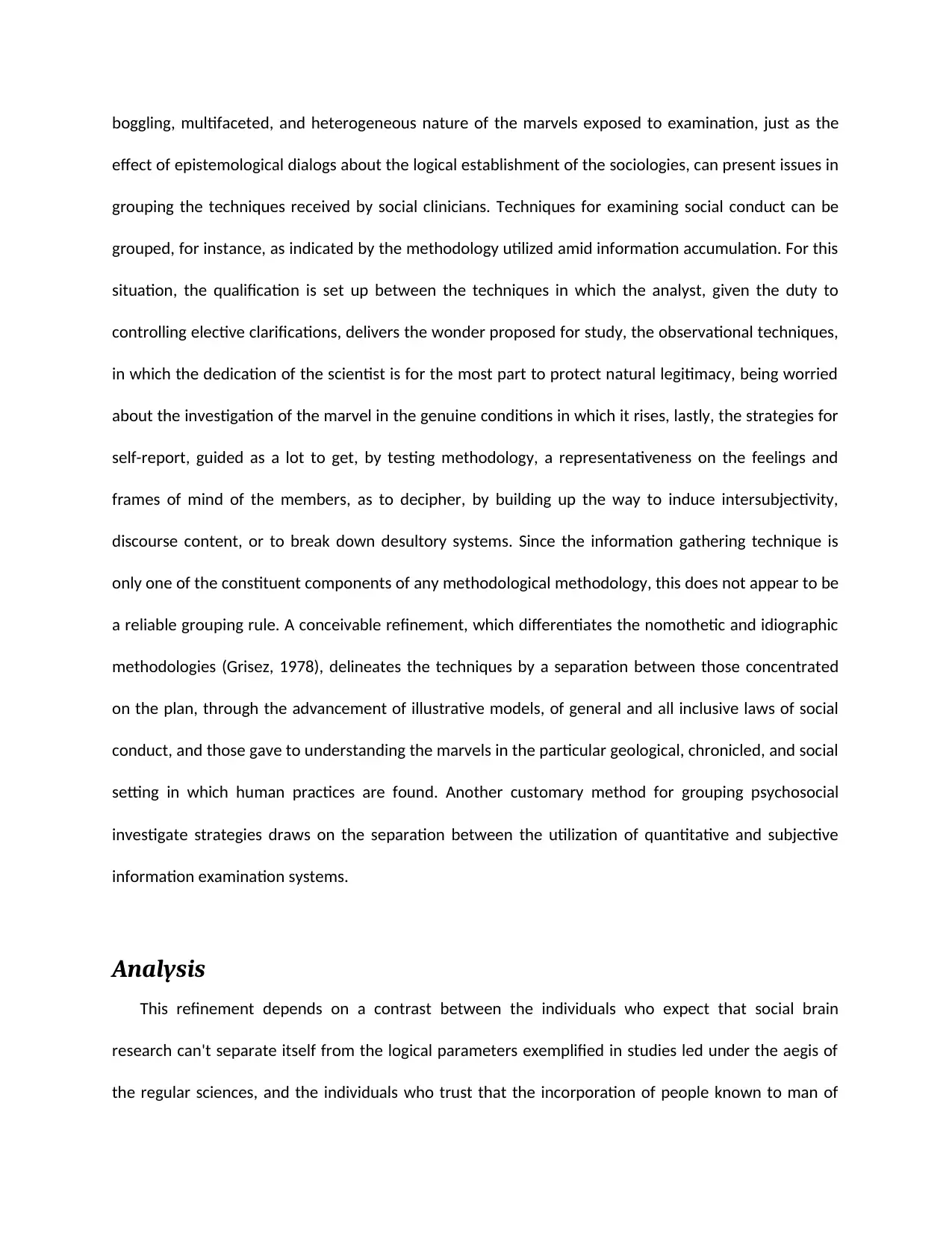
boggling, multifaceted, and heterogeneous nature of the marvels exposed to examination, just as the
effect of epistemological dialogs about the logical establishment of the sociologies, can present issues in
grouping the techniques received by social clinicians. Techniques for examining social conduct can be
grouped, for instance, as indicated by the methodology utilized amid information accumulation. For this
situation, the qualification is set up between the techniques in which the analyst, given the duty to
controlling elective clarifications, delivers the wonder proposed for study, the observational techniques,
in which the dedication of the scientist is for the most part to protect natural legitimacy, being worried
about the investigation of the marvel in the genuine conditions in which it rises, lastly, the strategies for
self-report, guided as a lot to get, by testing methodology, a representativeness on the feelings and
frames of mind of the members, as to decipher, by building up the way to induce intersubjectivity,
discourse content, or to break down desultory systems. Since the information gathering technique is
only one of the constituent components of any methodological methodology, this does not appear to be
a reliable grouping rule. A conceivable refinement, which differentiates the nomothetic and idiographic
methodologies (Grisez, 1978), delineates the techniques by a separation between those concentrated
on the plan, through the advancement of illustrative models, of general and all inclusive laws of social
conduct, and those gave to understanding the marvels in the particular geological, chronicled, and social
setting in which human practices are found. Another customary method for grouping psychosocial
investigate strategies draws on the separation between the utilization of quantitative and subjective
information examination systems.
Analysis
This refinement depends on a contrast between the individuals who expect that social brain
research can't separate itself from the logical parameters exemplified in studies led under the aegis of
the regular sciences, and the individuals who trust that the incorporation of people known to man of
effect of epistemological dialogs about the logical establishment of the sociologies, can present issues in
grouping the techniques received by social clinicians. Techniques for examining social conduct can be
grouped, for instance, as indicated by the methodology utilized amid information accumulation. For this
situation, the qualification is set up between the techniques in which the analyst, given the duty to
controlling elective clarifications, delivers the wonder proposed for study, the observational techniques,
in which the dedication of the scientist is for the most part to protect natural legitimacy, being worried
about the investigation of the marvel in the genuine conditions in which it rises, lastly, the strategies for
self-report, guided as a lot to get, by testing methodology, a representativeness on the feelings and
frames of mind of the members, as to decipher, by building up the way to induce intersubjectivity,
discourse content, or to break down desultory systems. Since the information gathering technique is
only one of the constituent components of any methodological methodology, this does not appear to be
a reliable grouping rule. A conceivable refinement, which differentiates the nomothetic and idiographic
methodologies (Grisez, 1978), delineates the techniques by a separation between those concentrated
on the plan, through the advancement of illustrative models, of general and all inclusive laws of social
conduct, and those gave to understanding the marvels in the particular geological, chronicled, and social
setting in which human practices are found. Another customary method for grouping psychosocial
investigate strategies draws on the separation between the utilization of quantitative and subjective
information examination systems.
Analysis
This refinement depends on a contrast between the individuals who expect that social brain
research can't separate itself from the logical parameters exemplified in studies led under the aegis of
the regular sciences, and the individuals who trust that the incorporation of people known to man of
⊘ This is a preview!⊘
Do you want full access?
Subscribe today to unlock all pages.

Trusted by 1+ million students worldwide
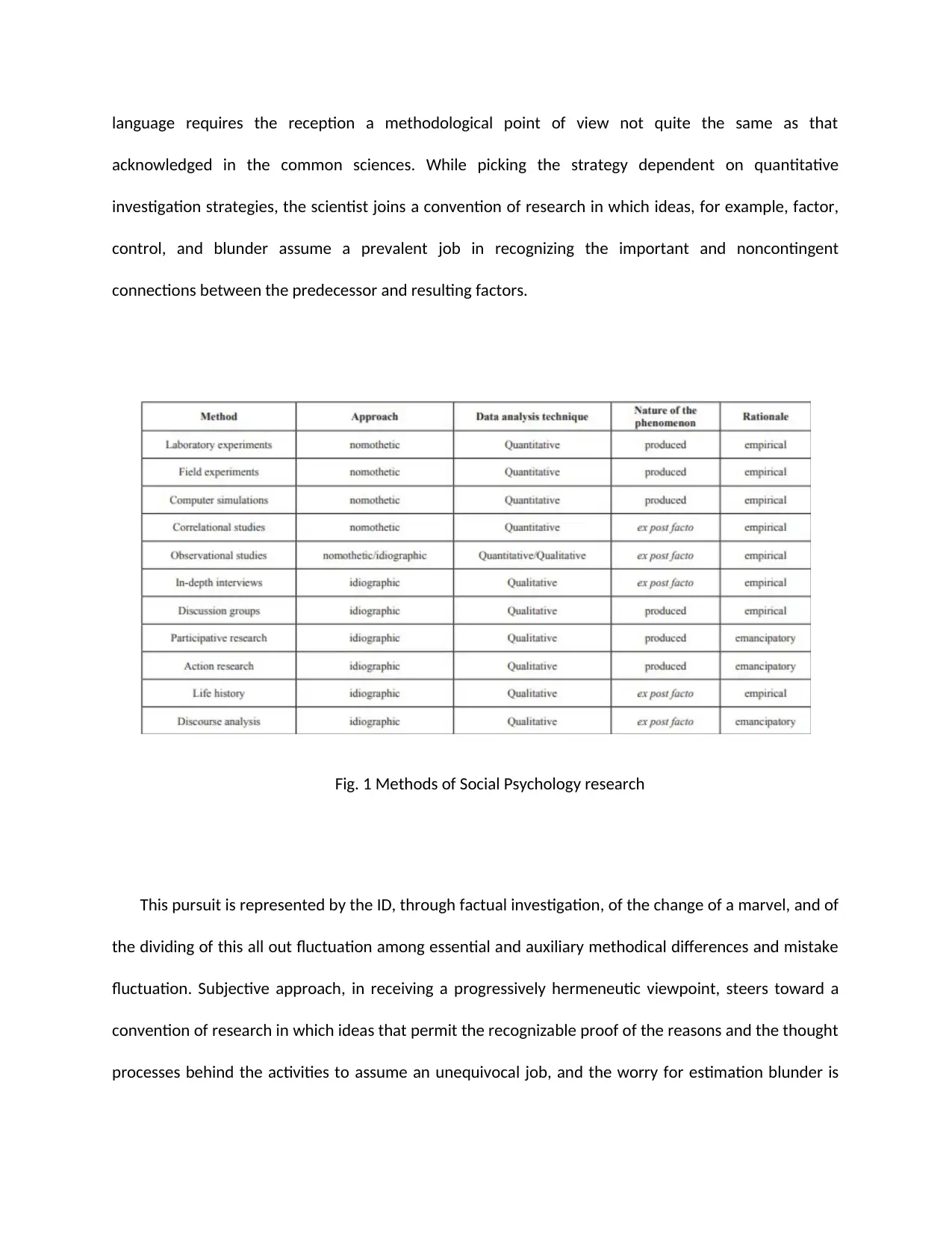
language requires the reception a methodological point of view not quite the same as that
acknowledged in the common sciences. While picking the strategy dependent on quantitative
investigation strategies, the scientist joins a convention of research in which ideas, for example, factor,
control, and blunder assume a prevalent job in recognizing the important and noncontingent
connections between the predecessor and resulting factors.
Fig. 1 Methods of Social Psychology research
This pursuit is represented by the ID, through factual investigation, of the change of a marvel, and of
the dividing of this all out fluctuation among essential and auxiliary methodical differences and mistake
fluctuation. Subjective approach, in receiving a progressively hermeneutic viewpoint, steers toward a
convention of research in which ideas that permit the recognizable proof of the reasons and the thought
processes behind the activities to assume an unequivocal job, and the worry for estimation blunder is
acknowledged in the common sciences. While picking the strategy dependent on quantitative
investigation strategies, the scientist joins a convention of research in which ideas, for example, factor,
control, and blunder assume a prevalent job in recognizing the important and noncontingent
connections between the predecessor and resulting factors.
Fig. 1 Methods of Social Psychology research
This pursuit is represented by the ID, through factual investigation, of the change of a marvel, and of
the dividing of this all out fluctuation among essential and auxiliary methodical differences and mistake
fluctuation. Subjective approach, in receiving a progressively hermeneutic viewpoint, steers toward a
convention of research in which ideas that permit the recognizable proof of the reasons and the thought
processes behind the activities to assume an unequivocal job, and the worry for estimation blunder is
Paraphrase This Document
Need a fresh take? Get an instant paraphrase of this document with our AI Paraphraser
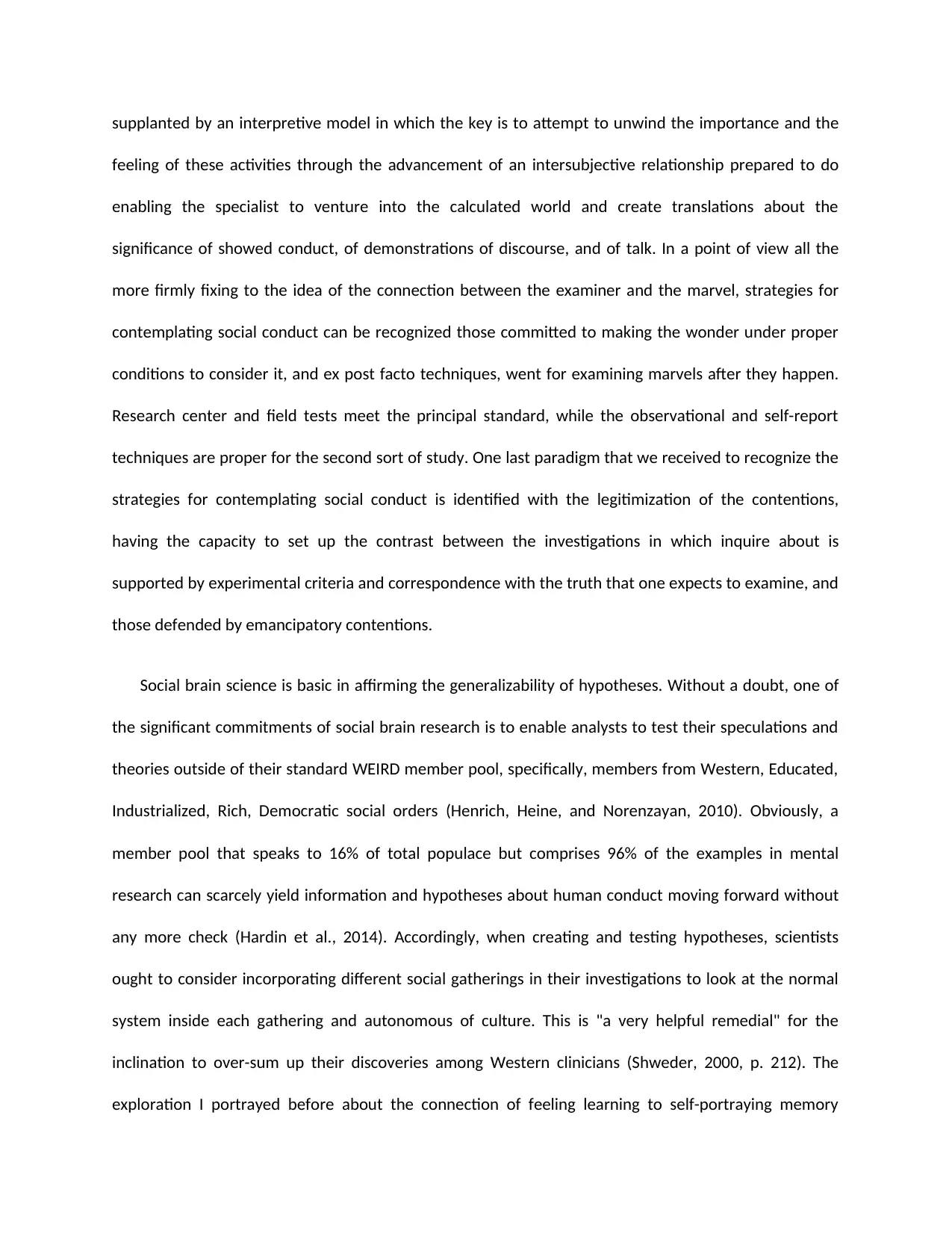
supplanted by an interpretive model in which the key is to attempt to unwind the importance and the
feeling of these activities through the advancement of an intersubjective relationship prepared to do
enabling the specialist to venture into the calculated world and create translations about the
significance of showed conduct, of demonstrations of discourse, and of talk. In a point of view all the
more firmly fixing to the idea of the connection between the examiner and the marvel, strategies for
contemplating social conduct can be recognized those committed to making the wonder under proper
conditions to consider it, and ex post facto techniques, went for examining marvels after they happen.
Research center and field tests meet the principal standard, while the observational and self-report
techniques are proper for the second sort of study. One last paradigm that we received to recognize the
strategies for contemplating social conduct is identified with the legitimization of the contentions,
having the capacity to set up the contrast between the investigations in which inquire about is
supported by experimental criteria and correspondence with the truth that one expects to examine, and
those defended by emancipatory contentions.
Social brain science is basic in affirming the generalizability of hypotheses. Without a doubt, one of
the significant commitments of social brain research is to enable analysts to test their speculations and
theories outside of their standard WEIRD member pool, specifically, members from Western, Educated,
Industrialized, Rich, Democratic social orders (Henrich, Heine, and Norenzayan, 2010). Obviously, a
member pool that speaks to 16% of total populace but comprises 96% of the examples in mental
research can scarcely yield information and hypotheses about human conduct moving forward without
any more check (Hardin et al., 2014). Accordingly, when creating and testing hypotheses, scientists
ought to consider incorporating different social gatherings in their investigations to look at the normal
system inside each gathering and autonomous of culture. This is "a very helpful remedial" for the
inclination to over-sum up their discoveries among Western clinicians (Shweder, 2000, p. 212). The
exploration I portrayed before about the connection of feeling learning to self-portraying memory
feeling of these activities through the advancement of an intersubjective relationship prepared to do
enabling the specialist to venture into the calculated world and create translations about the
significance of showed conduct, of demonstrations of discourse, and of talk. In a point of view all the
more firmly fixing to the idea of the connection between the examiner and the marvel, strategies for
contemplating social conduct can be recognized those committed to making the wonder under proper
conditions to consider it, and ex post facto techniques, went for examining marvels after they happen.
Research center and field tests meet the principal standard, while the observational and self-report
techniques are proper for the second sort of study. One last paradigm that we received to recognize the
strategies for contemplating social conduct is identified with the legitimization of the contentions,
having the capacity to set up the contrast between the investigations in which inquire about is
supported by experimental criteria and correspondence with the truth that one expects to examine, and
those defended by emancipatory contentions.
Social brain science is basic in affirming the generalizability of hypotheses. Without a doubt, one of
the significant commitments of social brain research is to enable analysts to test their speculations and
theories outside of their standard WEIRD member pool, specifically, members from Western, Educated,
Industrialized, Rich, Democratic social orders (Henrich, Heine, and Norenzayan, 2010). Obviously, a
member pool that speaks to 16% of total populace but comprises 96% of the examples in mental
research can scarcely yield information and hypotheses about human conduct moving forward without
any more check (Hardin et al., 2014). Accordingly, when creating and testing hypotheses, scientists
ought to consider incorporating different social gatherings in their investigations to look at the normal
system inside each gathering and autonomous of culture. This is "a very helpful remedial" for the
inclination to over-sum up their discoveries among Western clinicians (Shweder, 2000, p. 212). The
exploration I portrayed before about the connection of feeling learning to self-portraying memory
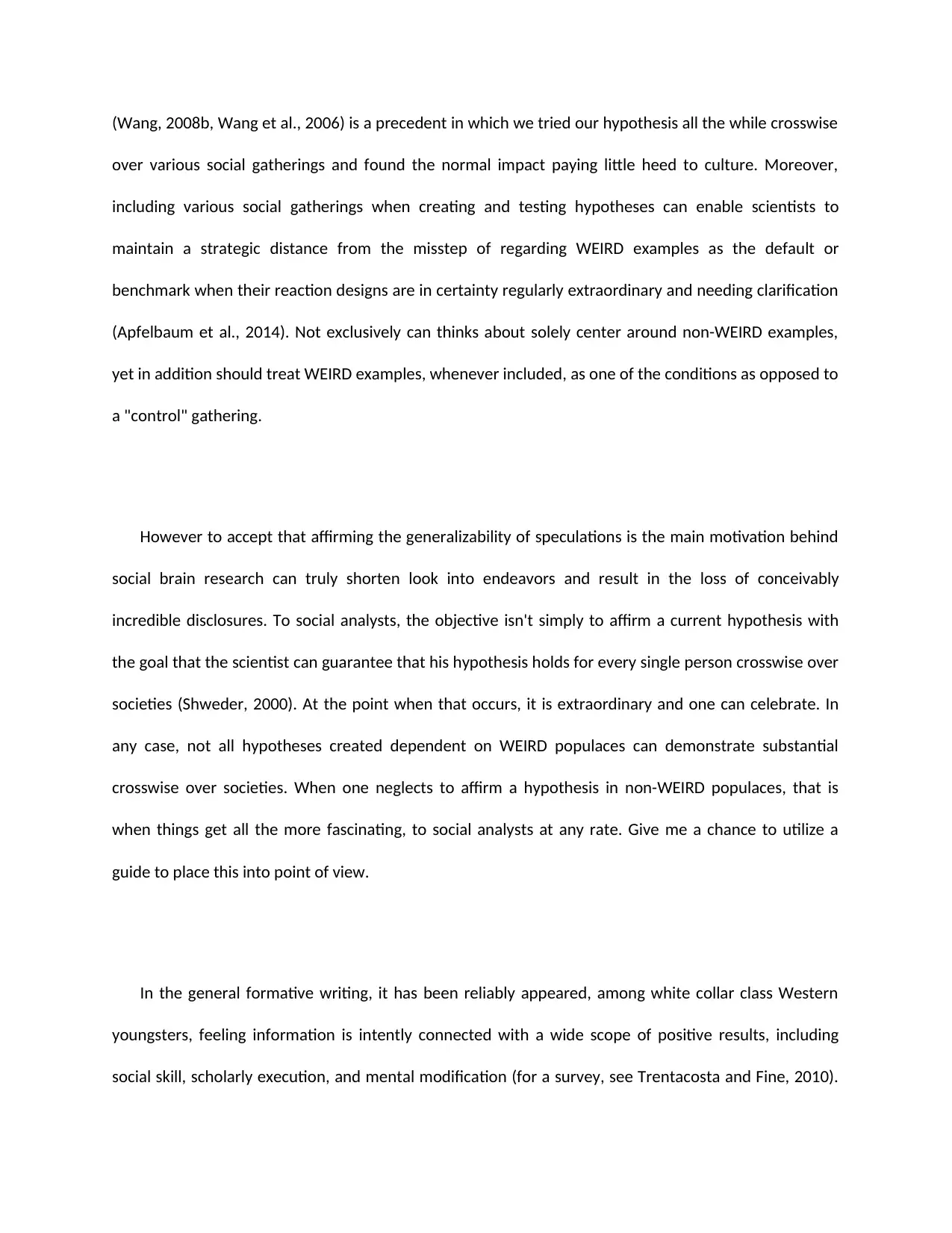
(Wang, 2008b, Wang et al., 2006) is a precedent in which we tried our hypothesis all the while crosswise
over various social gatherings and found the normal impact paying little heed to culture. Moreover,
including various social gatherings when creating and testing hypotheses can enable scientists to
maintain a strategic distance from the misstep of regarding WEIRD examples as the default or
benchmark when their reaction designs are in certainty regularly extraordinary and needing clarification
(Apfelbaum et al., 2014). Not exclusively can thinks about solely center around non-WEIRD examples,
yet in addition should treat WEIRD examples, whenever included, as one of the conditions as opposed to
a "control" gathering.
However to accept that affirming the generalizability of speculations is the main motivation behind
social brain research can truly shorten look into endeavors and result in the loss of conceivably
incredible disclosures. To social analysts, the objective isn't simply to affirm a current hypothesis with
the goal that the scientist can guarantee that his hypothesis holds for every single person crosswise over
societies (Shweder, 2000). At the point when that occurs, it is extraordinary and one can celebrate. In
any case, not all hypotheses created dependent on WEIRD populaces can demonstrate substantial
crosswise over societies. When one neglects to affirm a hypothesis in non-WEIRD populaces, that is
when things get all the more fascinating, to social analysts at any rate. Give me a chance to utilize a
guide to place this into point of view.
In the general formative writing, it has been reliably appeared, among white collar class Western
youngsters, feeling information is intently connected with a wide scope of positive results, including
social skill, scholarly execution, and mental modification (for a survey, see Trentacosta and Fine, 2010).
over various social gatherings and found the normal impact paying little heed to culture. Moreover,
including various social gatherings when creating and testing hypotheses can enable scientists to
maintain a strategic distance from the misstep of regarding WEIRD examples as the default or
benchmark when their reaction designs are in certainty regularly extraordinary and needing clarification
(Apfelbaum et al., 2014). Not exclusively can thinks about solely center around non-WEIRD examples,
yet in addition should treat WEIRD examples, whenever included, as one of the conditions as opposed to
a "control" gathering.
However to accept that affirming the generalizability of speculations is the main motivation behind
social brain research can truly shorten look into endeavors and result in the loss of conceivably
incredible disclosures. To social analysts, the objective isn't simply to affirm a current hypothesis with
the goal that the scientist can guarantee that his hypothesis holds for every single person crosswise over
societies (Shweder, 2000). At the point when that occurs, it is extraordinary and one can celebrate. In
any case, not all hypotheses created dependent on WEIRD populaces can demonstrate substantial
crosswise over societies. When one neglects to affirm a hypothesis in non-WEIRD populaces, that is
when things get all the more fascinating, to social analysts at any rate. Give me a chance to utilize a
guide to place this into point of view.
In the general formative writing, it has been reliably appeared, among white collar class Western
youngsters, feeling information is intently connected with a wide scope of positive results, including
social skill, scholarly execution, and mental modification (for a survey, see Trentacosta and Fine, 2010).
⊘ This is a preview!⊘
Do you want full access?
Subscribe today to unlock all pages.

Trusted by 1+ million students worldwide
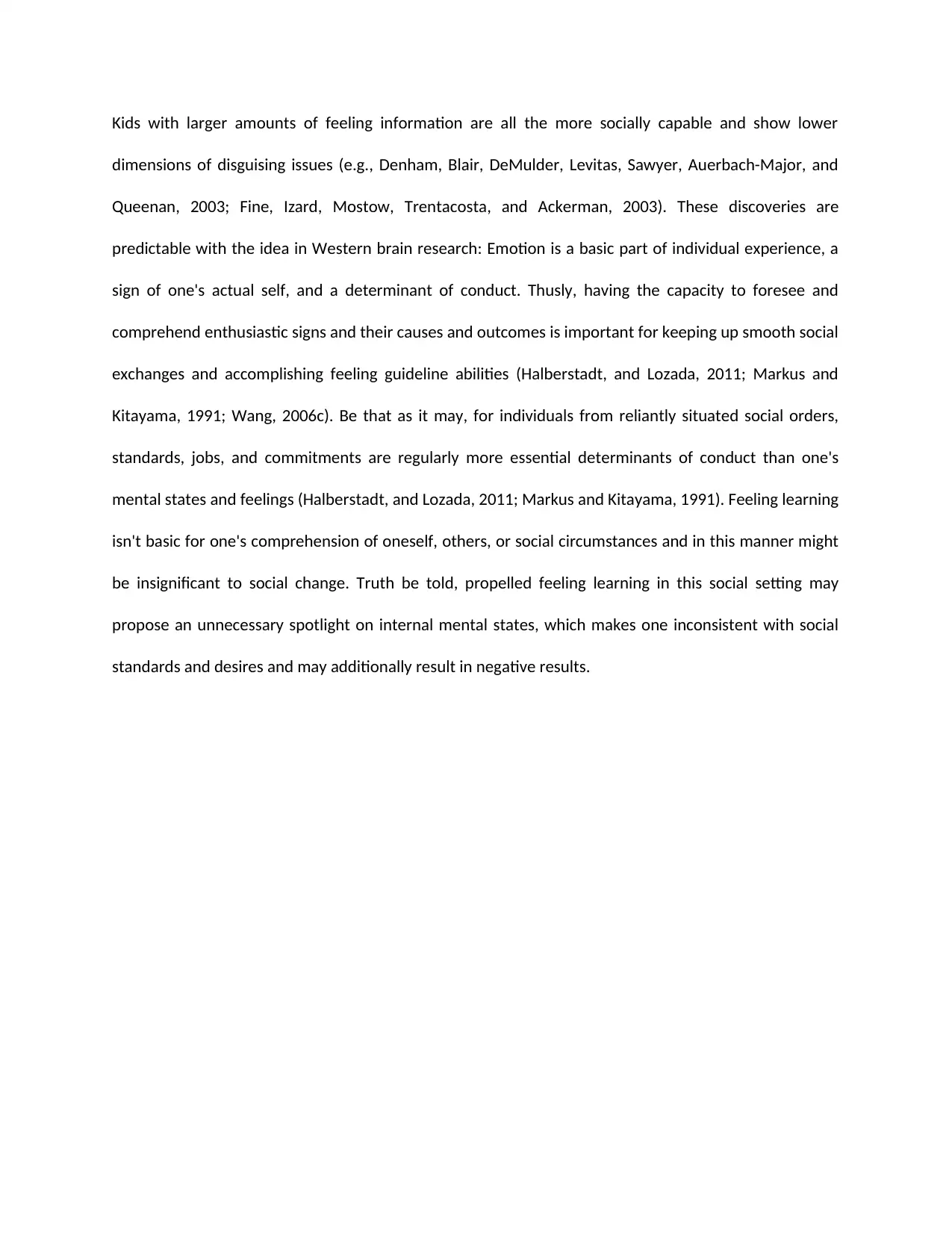
Kids with larger amounts of feeling information are all the more socially capable and show lower
dimensions of disguising issues (e.g., Denham, Blair, DeMulder, Levitas, Sawyer, Auerbach-Major, and
Queenan, 2003; Fine, Izard, Mostow, Trentacosta, and Ackerman, 2003). These discoveries are
predictable with the idea in Western brain research: Emotion is a basic part of individual experience, a
sign of one's actual self, and a determinant of conduct. Thusly, having the capacity to foresee and
comprehend enthusiastic signs and their causes and outcomes is important for keeping up smooth social
exchanges and accomplishing feeling guideline abilities (Halberstadt, and Lozada, 2011; Markus and
Kitayama, 1991; Wang, 2006c). Be that as it may, for individuals from reliantly situated social orders,
standards, jobs, and commitments are regularly more essential determinants of conduct than one's
mental states and feelings (Halberstadt, and Lozada, 2011; Markus and Kitayama, 1991). Feeling learning
isn't basic for one's comprehension of oneself, others, or social circumstances and in this manner might
be insignificant to social change. Truth be told, propelled feeling learning in this social setting may
propose an unnecessary spotlight on internal mental states, which makes one inconsistent with social
standards and desires and may additionally result in negative results.
dimensions of disguising issues (e.g., Denham, Blair, DeMulder, Levitas, Sawyer, Auerbach-Major, and
Queenan, 2003; Fine, Izard, Mostow, Trentacosta, and Ackerman, 2003). These discoveries are
predictable with the idea in Western brain research: Emotion is a basic part of individual experience, a
sign of one's actual self, and a determinant of conduct. Thusly, having the capacity to foresee and
comprehend enthusiastic signs and their causes and outcomes is important for keeping up smooth social
exchanges and accomplishing feeling guideline abilities (Halberstadt, and Lozada, 2011; Markus and
Kitayama, 1991; Wang, 2006c). Be that as it may, for individuals from reliantly situated social orders,
standards, jobs, and commitments are regularly more essential determinants of conduct than one's
mental states and feelings (Halberstadt, and Lozada, 2011; Markus and Kitayama, 1991). Feeling learning
isn't basic for one's comprehension of oneself, others, or social circumstances and in this manner might
be insignificant to social change. Truth be told, propelled feeling learning in this social setting may
propose an unnecessary spotlight on internal mental states, which makes one inconsistent with social
standards and desires and may additionally result in negative results.
Paraphrase This Document
Need a fresh take? Get an instant paraphrase of this document with our AI Paraphraser
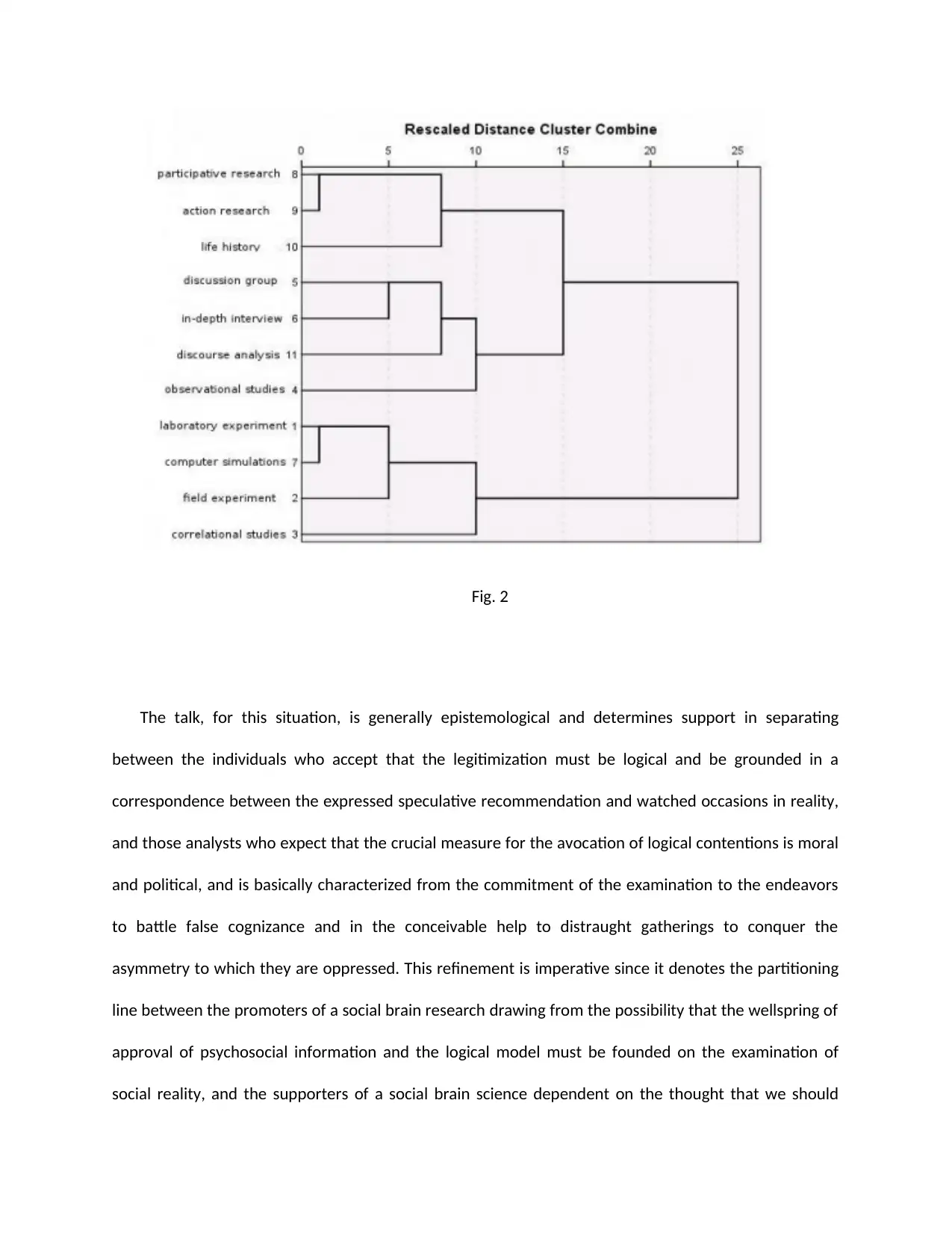
Fig. 2
The talk, for this situation, is generally epistemological and determines support in separating
between the individuals who accept that the legitimization must be logical and be grounded in a
correspondence between the expressed speculative recommendation and watched occasions in reality,
and those analysts who expect that the crucial measure for the avocation of logical contentions is moral
and political, and is basically characterized from the commitment of the examination to the endeavors
to battle false cognizance and in the conceivable help to distraught gatherings to conquer the
asymmetry to which they are oppressed. This refinement is imperative since it denotes the partitioning
line between the promoters of a social brain research drawing from the possibility that the wellspring of
approval of psychosocial information and the logical model must be founded on the examination of
social reality, and the supporters of a social brain science dependent on the thought that we should
The talk, for this situation, is generally epistemological and determines support in separating
between the individuals who accept that the legitimization must be logical and be grounded in a
correspondence between the expressed speculative recommendation and watched occasions in reality,
and those analysts who expect that the crucial measure for the avocation of logical contentions is moral
and political, and is basically characterized from the commitment of the examination to the endeavors
to battle false cognizance and in the conceivable help to distraught gatherings to conquer the
asymmetry to which they are oppressed. This refinement is imperative since it denotes the partitioning
line between the promoters of a social brain research drawing from the possibility that the wellspring of
approval of psychosocial information and the logical model must be founded on the examination of
social reality, and the supporters of a social brain science dependent on the thought that we should
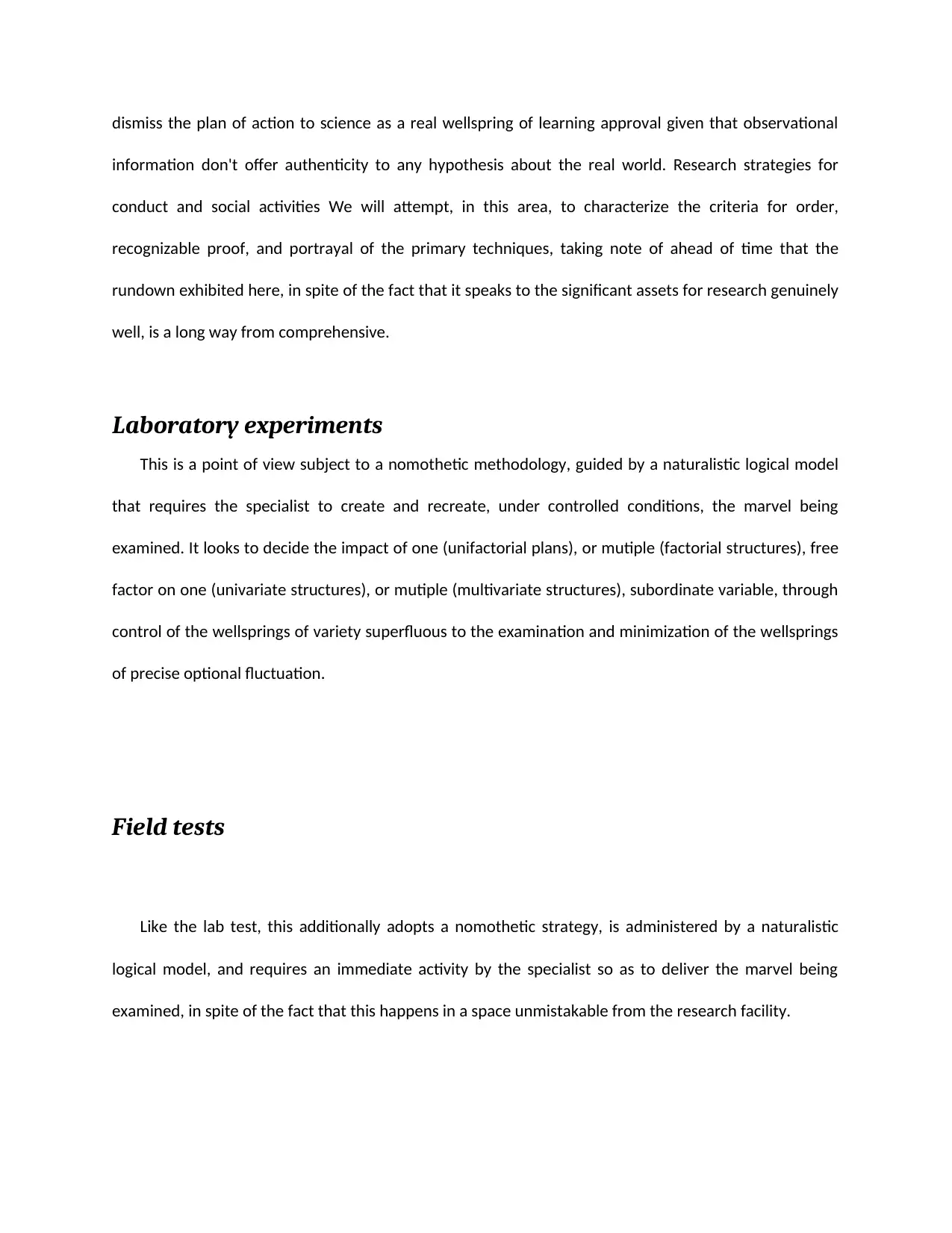
dismiss the plan of action to science as a real wellspring of learning approval given that observational
information don't offer authenticity to any hypothesis about the real world. Research strategies for
conduct and social activities We will attempt, in this area, to characterize the criteria for order,
recognizable proof, and portrayal of the primary techniques, taking note of ahead of time that the
rundown exhibited here, in spite of the fact that it speaks to the significant assets for research genuinely
well, is a long way from comprehensive.
Laboratory experiments
This is a point of view subject to a nomothetic methodology, guided by a naturalistic logical model
that requires the specialist to create and recreate, under controlled conditions, the marvel being
examined. It looks to decide the impact of one (unifactorial plans), or mutiple (factorial structures), free
factor on one (univariate structures), or mutiple (multivariate structures), subordinate variable, through
control of the wellsprings of variety superfluous to the examination and minimization of the wellsprings
of precise optional fluctuation.
Field tests
Like the lab test, this additionally adopts a nomothetic strategy, is administered by a naturalistic
logical model, and requires an immediate activity by the specialist so as to deliver the marvel being
examined, in spite of the fact that this happens in a space unmistakable from the research facility.
information don't offer authenticity to any hypothesis about the real world. Research strategies for
conduct and social activities We will attempt, in this area, to characterize the criteria for order,
recognizable proof, and portrayal of the primary techniques, taking note of ahead of time that the
rundown exhibited here, in spite of the fact that it speaks to the significant assets for research genuinely
well, is a long way from comprehensive.
Laboratory experiments
This is a point of view subject to a nomothetic methodology, guided by a naturalistic logical model
that requires the specialist to create and recreate, under controlled conditions, the marvel being
examined. It looks to decide the impact of one (unifactorial plans), or mutiple (factorial structures), free
factor on one (univariate structures), or mutiple (multivariate structures), subordinate variable, through
control of the wellsprings of variety superfluous to the examination and minimization of the wellsprings
of precise optional fluctuation.
Field tests
Like the lab test, this additionally adopts a nomothetic strategy, is administered by a naturalistic
logical model, and requires an immediate activity by the specialist so as to deliver the marvel being
examined, in spite of the fact that this happens in a space unmistakable from the research facility.
⊘ This is a preview!⊘
Do you want full access?
Subscribe today to unlock all pages.

Trusted by 1+ million students worldwide
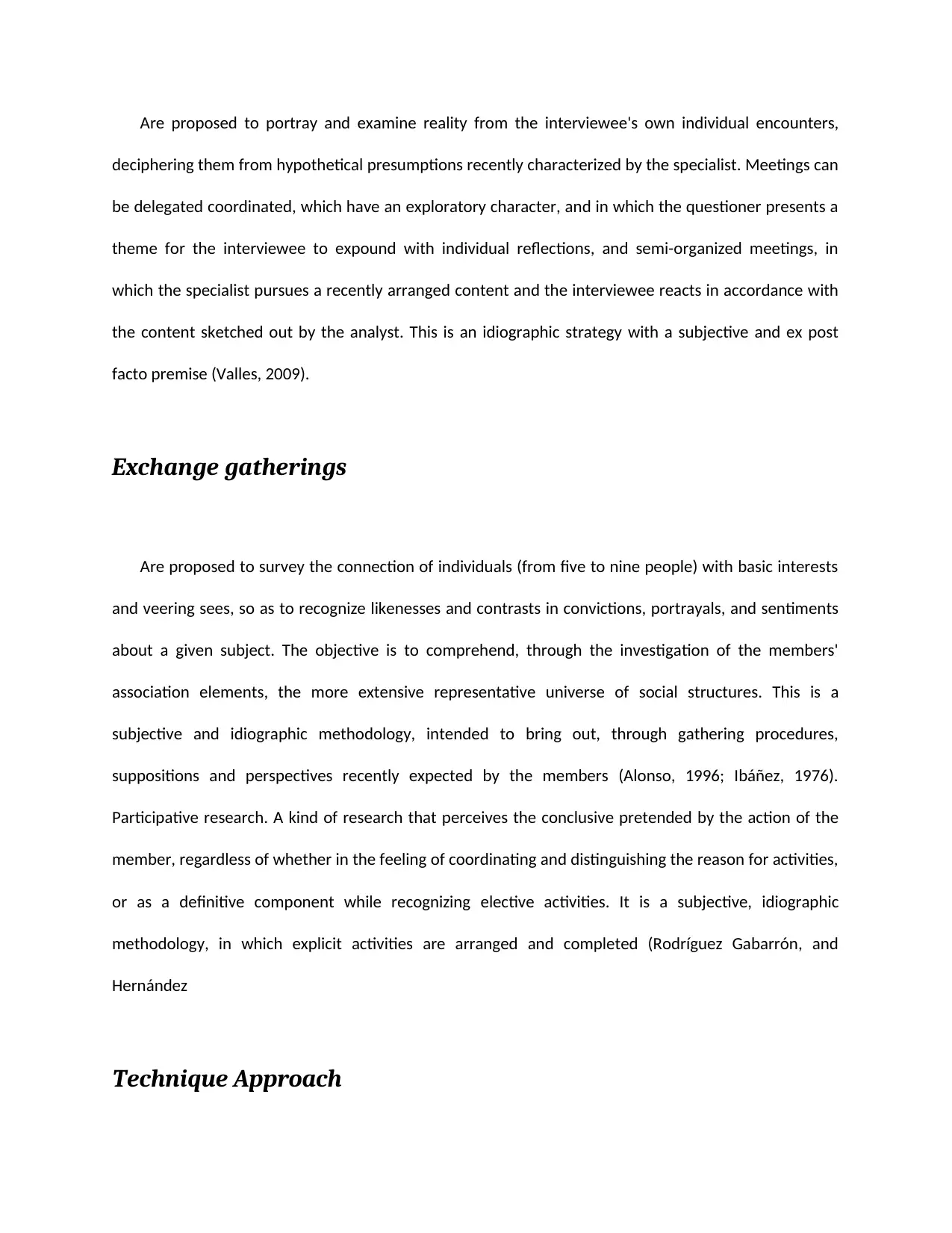
Are proposed to portray and examine reality from the interviewee's own individual encounters,
deciphering them from hypothetical presumptions recently characterized by the specialist. Meetings can
be delegated coordinated, which have an exploratory character, and in which the questioner presents a
theme for the interviewee to expound with individual reflections, and semi-organized meetings, in
which the specialist pursues a recently arranged content and the interviewee reacts in accordance with
the content sketched out by the analyst. This is an idiographic strategy with a subjective and ex post
facto premise (Valles, 2009).
Exchange gatherings
Are proposed to survey the connection of individuals (from five to nine people) with basic interests
and veering sees, so as to recognize likenesses and contrasts in convictions, portrayals, and sentiments
about a given subject. The objective is to comprehend, through the investigation of the members'
association elements, the more extensive representative universe of social structures. This is a
subjective and idiographic methodology, intended to bring out, through gathering procedures,
suppositions and perspectives recently expected by the members (Alonso, 1996; Ibáñez, 1976).
Participative research. A kind of research that perceives the conclusive pretended by the action of the
member, regardless of whether in the feeling of coordinating and distinguishing the reason for activities,
or as a definitive component while recognizing elective activities. It is a subjective, idiographic
methodology, in which explicit activities are arranged and completed (Rodríguez Gabarrón, and
Hernández
Technique Approach
deciphering them from hypothetical presumptions recently characterized by the specialist. Meetings can
be delegated coordinated, which have an exploratory character, and in which the questioner presents a
theme for the interviewee to expound with individual reflections, and semi-organized meetings, in
which the specialist pursues a recently arranged content and the interviewee reacts in accordance with
the content sketched out by the analyst. This is an idiographic strategy with a subjective and ex post
facto premise (Valles, 2009).
Exchange gatherings
Are proposed to survey the connection of individuals (from five to nine people) with basic interests
and veering sees, so as to recognize likenesses and contrasts in convictions, portrayals, and sentiments
about a given subject. The objective is to comprehend, through the investigation of the members'
association elements, the more extensive representative universe of social structures. This is a
subjective and idiographic methodology, intended to bring out, through gathering procedures,
suppositions and perspectives recently expected by the members (Alonso, 1996; Ibáñez, 1976).
Participative research. A kind of research that perceives the conclusive pretended by the action of the
member, regardless of whether in the feeling of coordinating and distinguishing the reason for activities,
or as a definitive component while recognizing elective activities. It is a subjective, idiographic
methodology, in which explicit activities are arranged and completed (Rodríguez Gabarrón, and
Hernández
Technique Approach
Paraphrase This Document
Need a fresh take? Get an instant paraphrase of this document with our AI Paraphraser
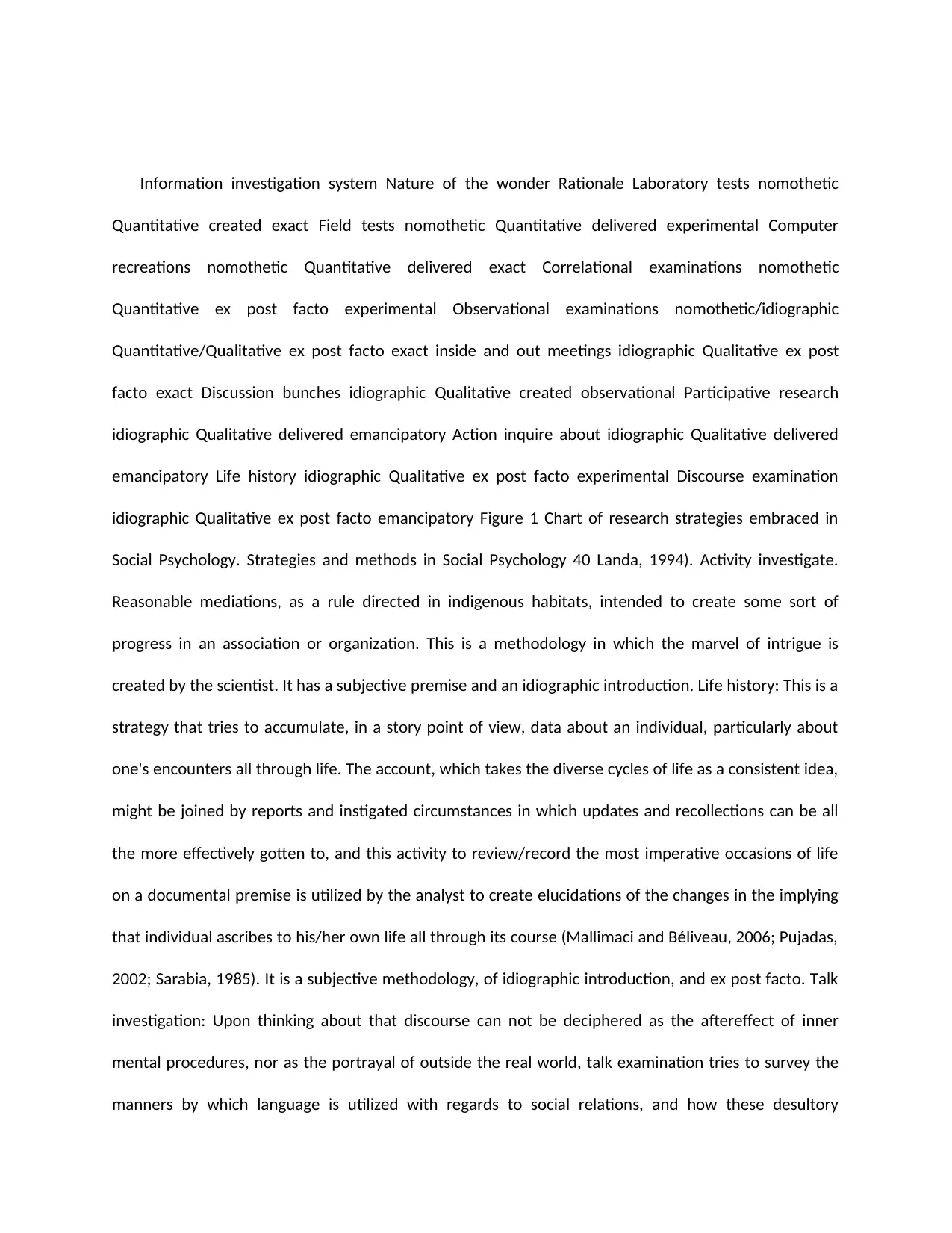
Information investigation system Nature of the wonder Rationale Laboratory tests nomothetic
Quantitative created exact Field tests nomothetic Quantitative delivered experimental Computer
recreations nomothetic Quantitative delivered exact Correlational examinations nomothetic
Quantitative ex post facto experimental Observational examinations nomothetic/idiographic
Quantitative/Qualitative ex post facto exact inside and out meetings idiographic Qualitative ex post
facto exact Discussion bunches idiographic Qualitative created observational Participative research
idiographic Qualitative delivered emancipatory Action inquire about idiographic Qualitative delivered
emancipatory Life history idiographic Qualitative ex post facto experimental Discourse examination
idiographic Qualitative ex post facto emancipatory Figure 1 Chart of research strategies embraced in
Social Psychology. Strategies and methods in Social Psychology 40 Landa, 1994). Activity investigate.
Reasonable mediations, as a rule directed in indigenous habitats, intended to create some sort of
progress in an association or organization. This is a methodology in which the marvel of intrigue is
created by the scientist. It has a subjective premise and an idiographic introduction. Life history: This is a
strategy that tries to accumulate, in a story point of view, data about an individual, particularly about
one's encounters all through life. The account, which takes the diverse cycles of life as a consistent idea,
might be joined by reports and instigated circumstances in which updates and recollections can be all
the more effectively gotten to, and this activity to review/record the most imperative occasions of life
on a documental premise is utilized by the analyst to create elucidations of the changes in the implying
that individual ascribes to his/her own life all through its course (Mallimaci and Béliveau, 2006; Pujadas,
2002; Sarabia, 1985). It is a subjective methodology, of idiographic introduction, and ex post facto. Talk
investigation: Upon thinking about that discourse can not be deciphered as the aftereffect of inner
mental procedures, nor as the portrayal of outside the real world, talk examination tries to survey the
manners by which language is utilized with regards to social relations, and how these desultory
Quantitative created exact Field tests nomothetic Quantitative delivered experimental Computer
recreations nomothetic Quantitative delivered exact Correlational examinations nomothetic
Quantitative ex post facto experimental Observational examinations nomothetic/idiographic
Quantitative/Qualitative ex post facto exact inside and out meetings idiographic Qualitative ex post
facto exact Discussion bunches idiographic Qualitative created observational Participative research
idiographic Qualitative delivered emancipatory Action inquire about idiographic Qualitative delivered
emancipatory Life history idiographic Qualitative ex post facto experimental Discourse examination
idiographic Qualitative ex post facto emancipatory Figure 1 Chart of research strategies embraced in
Social Psychology. Strategies and methods in Social Psychology 40 Landa, 1994). Activity investigate.
Reasonable mediations, as a rule directed in indigenous habitats, intended to create some sort of
progress in an association or organization. This is a methodology in which the marvel of intrigue is
created by the scientist. It has a subjective premise and an idiographic introduction. Life history: This is a
strategy that tries to accumulate, in a story point of view, data about an individual, particularly about
one's encounters all through life. The account, which takes the diverse cycles of life as a consistent idea,
might be joined by reports and instigated circumstances in which updates and recollections can be all
the more effectively gotten to, and this activity to review/record the most imperative occasions of life
on a documental premise is utilized by the analyst to create elucidations of the changes in the implying
that individual ascribes to his/her own life all through its course (Mallimaci and Béliveau, 2006; Pujadas,
2002; Sarabia, 1985). It is a subjective methodology, of idiographic introduction, and ex post facto. Talk
investigation: Upon thinking about that discourse can not be deciphered as the aftereffect of inner
mental procedures, nor as the portrayal of outside the real world, talk examination tries to survey the
manners by which language is utilized with regards to social relations, and how these desultory
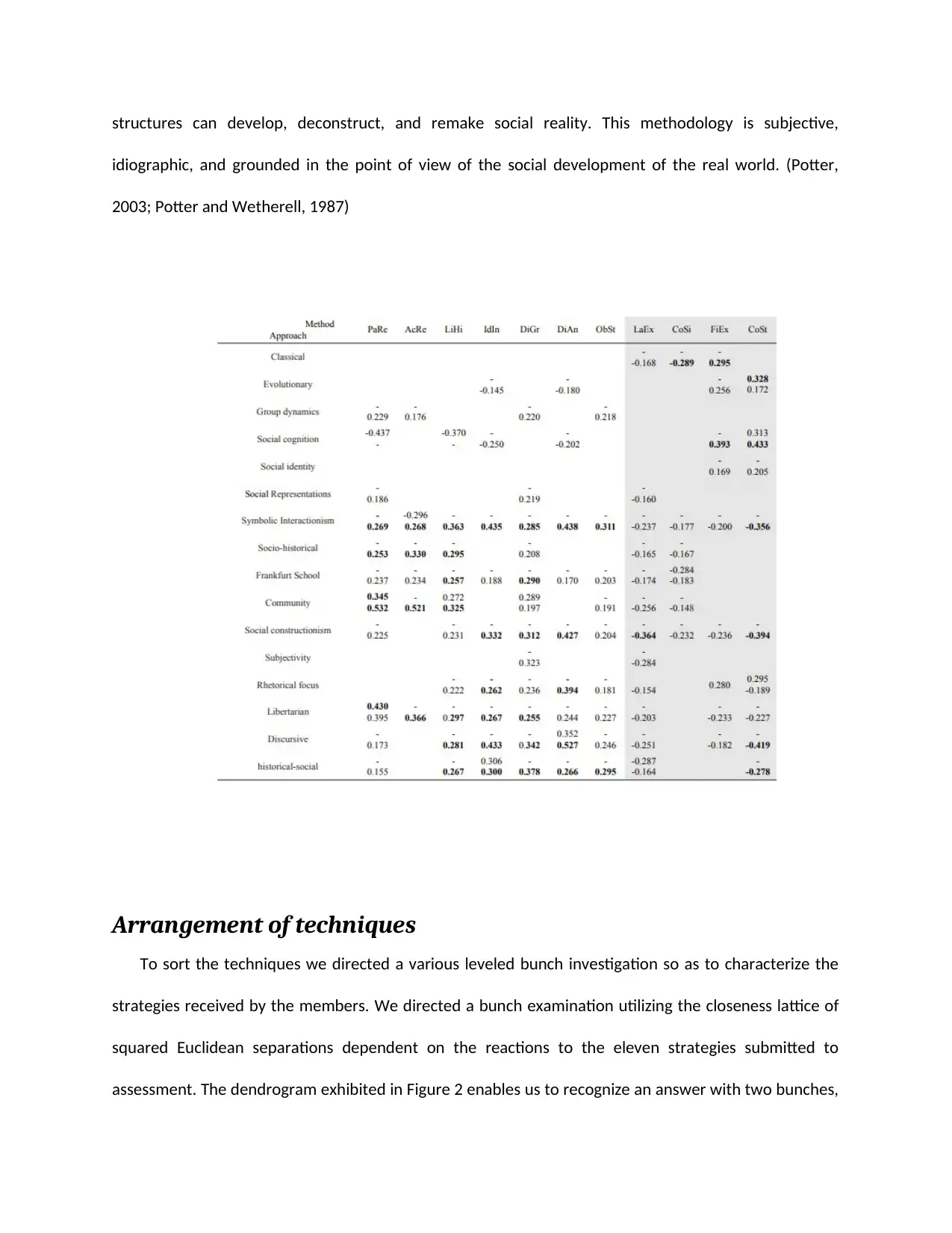
structures can develop, deconstruct, and remake social reality. This methodology is subjective,
idiographic, and grounded in the point of view of the social development of the real world. (Potter,
2003; Potter and Wetherell, 1987)
Arrangement of techniques
To sort the techniques we directed a various leveled bunch investigation so as to characterize the
strategies received by the members. We directed a bunch examination utilizing the closeness lattice of
squared Euclidean separations dependent on the reactions to the eleven strategies submitted to
assessment. The dendrogram exhibited in Figure 2 enables us to recognize an answer with two bunches,
idiographic, and grounded in the point of view of the social development of the real world. (Potter,
2003; Potter and Wetherell, 1987)
Arrangement of techniques
To sort the techniques we directed a various leveled bunch investigation so as to characterize the
strategies received by the members. We directed a bunch examination utilizing the closeness lattice of
squared Euclidean separations dependent on the reactions to the eleven strategies submitted to
assessment. The dendrogram exhibited in Figure 2 enables us to recognize an answer with two bunches,
⊘ This is a preview!⊘
Do you want full access?
Subscribe today to unlock all pages.

Trusted by 1+ million students worldwide
1 out of 15
Related Documents
Your All-in-One AI-Powered Toolkit for Academic Success.
+13062052269
info@desklib.com
Available 24*7 on WhatsApp / Email
![[object Object]](/_next/static/media/star-bottom.7253800d.svg)
Unlock your academic potential
Copyright © 2020–2026 A2Z Services. All Rights Reserved. Developed and managed by ZUCOL.





